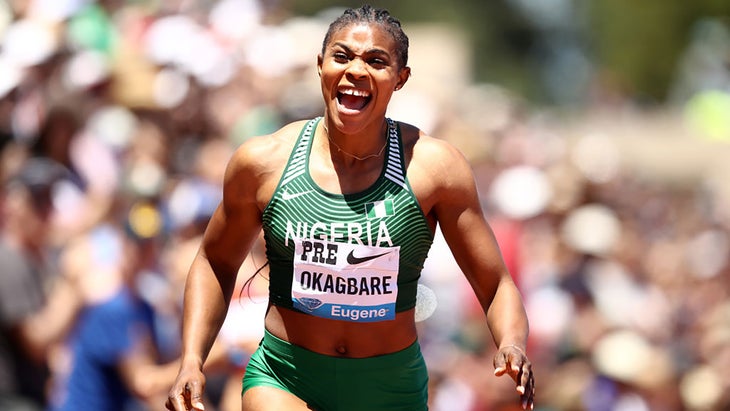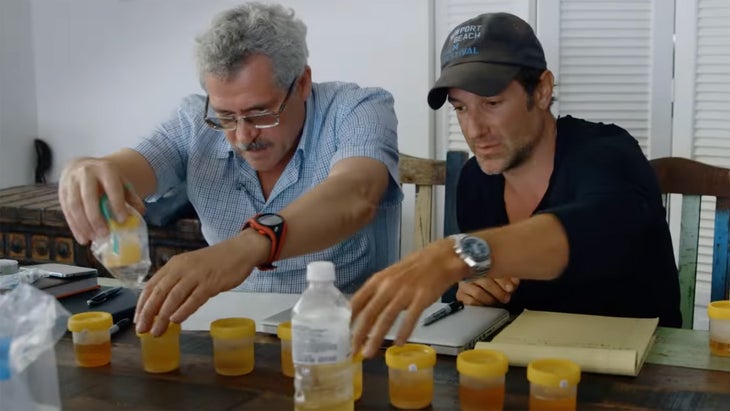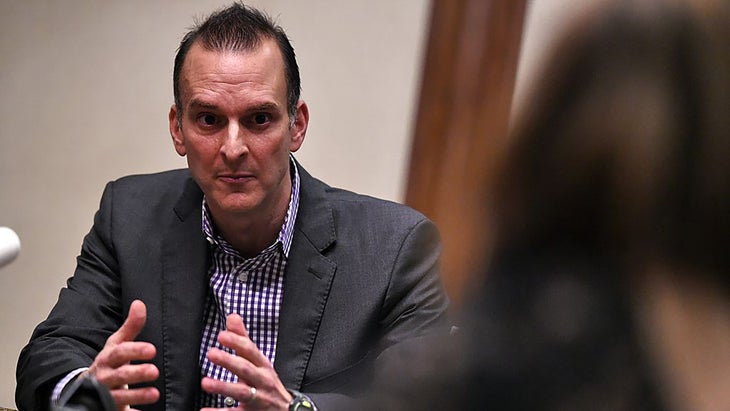No products in the cart.
Outdoor Adventure
This Could Be a Game Changer in the Fight Against Doping
On July 30, 2021, the fastest female sprinters in the world bounced out their nerves and adjusted their blocks in preparation for the semifinals of the 100 meters at the Tokyo Olympics. Amid the prerace tension, in the center of the track, lane five sat conspicuously empty. Just hours before the event, Nigerian sprinter Blessing Okagbare had received a provisional suspension from the Athletics Integrity Unit (AIU), the anti-doping organization that oversees international track and field.
Leading into the Games, the then 32-year-old Okagbare had run the 100 faster than ever, clocking multiple sub-11-second times and equaling the world record at the Nigerian national championships. (The times were unofficial, as judges deemed them wind-assisted.) Without the last-minute sanction, says Travis Tygart, CEO of the United States Anti-Doping Agency (USADA), “she was going to be in the final. There’s no doubt about that, if you look at her times and the drugs she was using to win.”
The investigation had begun months before, after a fellow athlete discovered performance-enhancing drugs—or PEDs—addressed to Okagbare and sent a tip to the USADA. While Okagbare was competing in Slovakia and Nigeria, USADA and the AIU administered two targeted drug tests—one came back positive for growth hormone, and the other showed traces of the banned blood booster EPO. Under the old rules governing American anti-doping, the investigation would likely have concluded with Okagbare’s suspension. But because of a federal law enacted in December 2020, the Rodchenkov Anti-Doping Act (RADA), the FBI and prosecutors from the Department of Justice began an investigation to see whether Okagbare could lead them to a bigger offender.

When Okagbare returned home from Tokyo, federal agents were waiting at the airport. As she stepped onto U.S. soil, an operative with the FBI asked to see her phone. Incriminating messages on Okagbare’s WhatsApp eventually led to doping sanctions for three additional Olympic-level track athletes and a jail sentence for the man who supplied them with PEDs—a Texan named Eric Lira.
In May 2023, Lira, a self-described kinesiologist and naturopath from El Paso, became the first person convicted under the Rodchenkov Act. He faces a maximum ten-year prison sentence and a fine of up to one million dollars.
International Politics and Anti-Doping
The Rodchenkov Act is named after Grigory Rodchenkov. You might remember him as the quirky Russian scientist and whistleblower from Icarus, the 2017 Academy Award–winning documentary. In the film, Rodchenkov, who ran Russia’s anti-doping laboratory, detailed a vast conspiracy to evade drug tests and secure medals at the 2014 Olympics in Sochi. He alleged that Russia’s state-run doping system involved more than 1,000 athletes and coaches, officials at the country’s Ministry of Sport, and officers from the Federal Security Service—the contemporary equivalent of the KGB—and provided emails and spreadsheets to anti-doping officials backing up his claims. Rodchenkov had personally helped swap drug-tainted pee for clean urine stored in soda containers at the Russian anti-doping lab.
Using testimony from Rodchenkov, the World Anti-Doping Agency (WADA) issued a damning report on Russia’s flagrant cheating and recommended excluding the country’s track and field team from the 2016 Rio Olympics. But the International Olympic Committee, an organization riddled with conflicts of interest and frequently beset with corruption scandals, allowed Russian athletes to compete at subsequent Olympic Games—just not under Russia’s flag.
That lack of accountability on the international stage deeply concerned policy advisers in the U.S. who study the rise of authoritarian governments. Russia’s state-run doping has been viewed by Congress as a national-security issue. If a country can essentially steal Olympic medals, what else might it try to get away with?
“International sport is a lot more important for the rest of the world than it is for us,” says Paul Massaro, a senior policy adviser at the U.S. Helsinki Commission, which monitors human rights around the world and helped draft the Rodchenkov Act. “For Russia and China in particular, they’re massive. There’s a reason these autocratic countries keep hosting the Games. They view them as a way to say, ‘Hey, look at all the medals we’re winning, look how big and powerful we are. Don’t fuck with us.’”

Don’t fuck with us indeed. Following the release of WADA’s Russia report, two top officials at the Russian anti-doping laboratory mysteriously died. When Rodchenkov, who lives in the U.S. under witness protection, testified in favor of the law bearing his name, he wore a ski mask to conceal his current appearance.
The Rodchenkov Act applies to any event attended by at least one U.S. athlete and three or more international athletes, and broadcast or sponsored by a U.S. business or organization. It specifically targets doping networks: doctors, trainers, and drug suppliers who work with multiple athletes. The law also offers certain protections—for example, an athlete who acted alone can’t be prosecuted under RADA. Nor can one who unintentionally ingested a banned substance.
For two-time U.S. Olympic runner Molly Huddle, the protections helped garner her support for the law. “Much of the criticism I heard was, ‘We don’t need to be throwing more people in jail,’” said Huddle. “Instead, the law focuses on the outer rings of doping conspiracies.”
Additionally, RADA has extraterritorial jurisdiction, meaning that citizens of other countries involved in doping networks can be arrested in the U.S. or charged under the law and then extradited back to their home country. This power could be applied to cases like that of Russian figure skater Kamila Valieva, who tested positive at the Beijing Olympics in 2022 when she was 15.
“If evidence is collected on Russian individuals who were involved in doping that athlete and defrauding those Olympics, and then those individuals come to the U.S., they can be arrested at the airport,” says Massaro. “We have the World Cup and the Olympics coming to the United States within the next five years. There’s an expectation that these should be the cleanest Games ever.”
A Method for Exposing Drug Rings
In its first test at trial, the Rodchenkov Act did not expose state-sponsored malfeasance or involve matters of national security. But it did shutter an active doping ring at the top levels of track and field. The WhatsApp messages on Blessing Okagbare’s phone showed that she had relied heavily on the drug supplier whose name was listed in her contacts as “Eric Lira Doctor.” (Lira is not a doctor.)
Other messages showed that Okagbare sought Lira’s guidance as the authorities closed in on her. Ahead of the Tokyo Olympics, on June 13, 2021, a USADA agent arrived at Okagbare’s home to collect a sample for an unscheduled test. Anti-doping authorities suspected Okagbare was using EPO, among other substances. She didn’t answer the door.
Instead, she messaged Lira: “So I took 2000ui of the E yesterday, is it safe to take a test this morning?” Lira replied: “Good day, 2000 ui is a low dosage.”
“Remember I took it Wednesday and then yesterday again,” Okagbare wrote. “I wasn’t sure so I didn’t take a test. I just let them go so it will be a missed test.”
The close call didn’t faze Okagbare. Nine days later, she ran 10.63 seconds to match the wind-assisted world record in the 100. Okagbare messaged Lira: “Hola amigo. Eric my body feel so good. I am sooooo happy Ericccccccc. Whatever you did, is working so well.” Lira would later reply, “What you did is going to help you for the upcoming events. You are doing your part and you will be ready to dominate.”
Eventually Okagbare’s luck ran out, and one of the tests came back positive for human growth hormone. On the day of her provisional suspension ahead of the Olympic semifinals, on July 30, 2021, she sent Lira a copy of her positive HGH test result and wrote, “Call me urgently. I don’t understand.” Lira advised Okagbare to claim she’d consumed contaminated meat, a known cause of inadvertent positive tests.
Later, faced with potential jail time, Lira became less supportive. In May 2023, in a Manhattan courtroom, he pleaded guilty to the Rodchenkov Act charges. He also provided USADA with information that led to the sanctioning of Okagbare’s Nigerian teammate Divine Oduduru; triple jumper Sabina Allen, who competes for Jamaica; and Jamaican-born sprinter Alex Wilson, who competes for Switzerland. More sanctions may be forthcoming from Lira’s case.
In the past, similar criminal investigations that treated doping as fraud proved effective in exposing athletes. Using search warrants and subpoenas in the notorious BALCO scandal, which unveiled a doping ring operating out of a California laboratory, federal investigators discovered rampant PED use among baseball stars Barry Bonds and Roger Clemens and Olympic sprinter Marion Jones. In 2012, after federal agents forced teammates of seven-time Tour de France champion Lance Armstrong to testify under oath, they uncovered an extensive, deeply entrenched doping program.
But without an apparatus like the Rodchenkov Act in place, the case against Armstrong eventually stalled. Federal prosecutors lacked a strong legal framework to take it to trial, and the investigation didn’t yield meaningful potential criminal penalties. A fraud case involving Armstrong and those complicit in his team’s doping program was ultimately dropped by the U.S. Attorney’s office. USADA did eventually use the information obtained by federal agents to issue a lifetime ban on Armstrong.
Hopes For a Cleaner Future
I raced on the U.S. national cycling team and at the elite level during the Armstrong era, and later wrote about the sport’s culture of doping both at home and abroad. I saw how team doctors, owners, and racing officials fostered cheating yet often escaped accountability when busts occurred. Athletes who tested positive were punished, and the investigations stopped there. I knew that few cheaters acted alone; doping flourished in cycling because enablers existed at every level. After watching case after case fail to excise drug use from the sport, the message seemed to be that doping did in fact pay.

With the Rodchenkov Act, authorities now have the power to ascend the PED chain from athlete to coach to supplier and beyond. By sharing information with law enforcement and threatening criminal prosecution, anti-doping agencies can stymie entire doping conspiracies, not just individual athletes.
“Sport affects culture. And if sport tips toward the disempowering, ugly side of competition, then a lot of things are going to tip that way,” says Huddle. “It’s like letting a part of your body be sick and being like, ‘Whatever, it’s not going to affect the rest of me.’ But it will eventually.”
Not everybody likes the Rodchenkov Act as much as I do. The World Anti Doping Agency actually lobbied against it. In a statement, WADA president Witold Banka expressed concern over the law’s extraterritorial jurisdiction and noted the exclusion of U.S. professional and collegiate leagues like the NFL and NCAA. “These leagues were originally included in the act but were subsequently removed without explanation,” he said. “If it is not good enough for American sports, why is it being imposed on the rest of the world?”
When I asked Tygart what safeguards existed to prevent overreach, he pointed to the due-process protections already built into the U.S. criminal justice system. In the case against Lira, the Rodchenkov Act survived its first legal challenge. A pretrial motion filed by Lira’s lawyer claimed that the law violated the Constitution, in that Lira’s right to free speech protected his messages with Okagbare. A judge ultimately denied the motion, stating that “speech integral to criminal conduct” isn’t protected.
The Rodchenkov Act will face further challenges and additional scrutiny. If it’s used as intended, those who’ve accrued wealth and power by corrupting sport—in the U.S. and around the world—will be held to account. If successful, the law will bring about more ethical competition, and perhaps a more just society.
Source link

